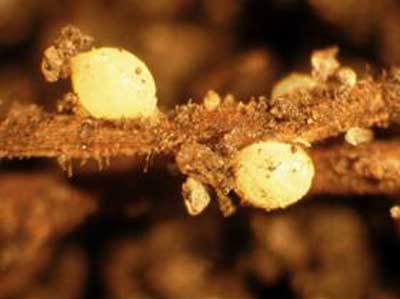
Dr. Greg Tylka, Iowa State University Nematologist, recently reported on a study conducted to determine the suitability of certain cover crop plants to serve as hosts for soybean cyst nematodes (SCN). Dr. Tylka focused on legume species, since almost 100 species of legumes are reported, in the literature, to be SCN hosts.
Two greenhouse studies were recently conducted, reviewing host suitability of the following legumes: Berseem clover, cowpea, crimson clover, red clover (3 varieties), sweet clover, white clover (2 varieties), Austrian winter peas and field peas. Six to twelve replicate plants of each of these legumes were grown in SCN-infested soil for 30 days and the roots were then inspected to determine if any nematodes survived on the roots. According to Dr. Tylka, almost no SCN reproduction occurred on these plants. The conclusion is that all of these legumes should be able to be grown without increasing populations of the SCN.
In addition, Dr. Tylka speculated that cruciferous cover crop plants, like tillage radishes, rapeseed, and mustard may have a negative effect on SCN populations. Certain rapeseed varieties have been shown to have a negative effect on nematodes when leaves are incorporated into the soil. Other cover crop species may stimulate SCN egg hatch but not permit successful feeding by the SCN juveniles. If correct, these factors may have a suppressive effect on SCN populations. It is important to note that negative effects of cover crop species against SCN have not been thoroughly studied.
In contrast to Dr. Tylka’s recent work, some literature indicates that alsike, crimson clover, scarlet clover, and burclover are hosts of SCN. Other crops and wild plants listed as SCN hosts include birdsfoot trefoil, cowpea, sweet clover, hopclover, lespedeza, peas, vetches (common, hairy, winter & crown), and white & yellow lupine.
Also included as SCN hosts, according to the literature, are weed hosts that include henbit, purple deadnettle, field pennycress, shepherd’s-purse, small-flower bittercress, common and mouse-ear chickweed, common mullein, ground cherry, pokeweed, purslane and spotted geranium. Purdue University research (Mock, etal.) indicates that henbit and purple deadnettle are strong hosts for SCN, with nematode reproduction having been noted on these plants in the field. Field pennycress is documented as being a moderate host for SCN.
Ohio State University research indicates that different SCN races (HG types) have differing ability to successfully attack and reproduce on weed hosts. It may be helpful to conduct a study to determine if different SCN races or HG types also have differing preference or ability to attack cover crop species. No such study has yet been conducted.